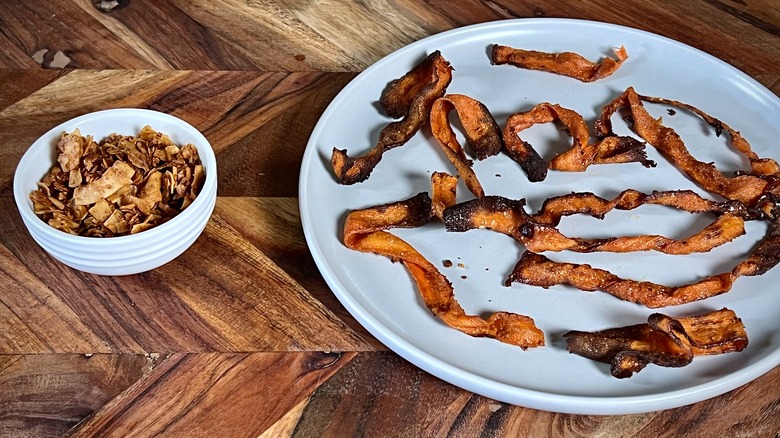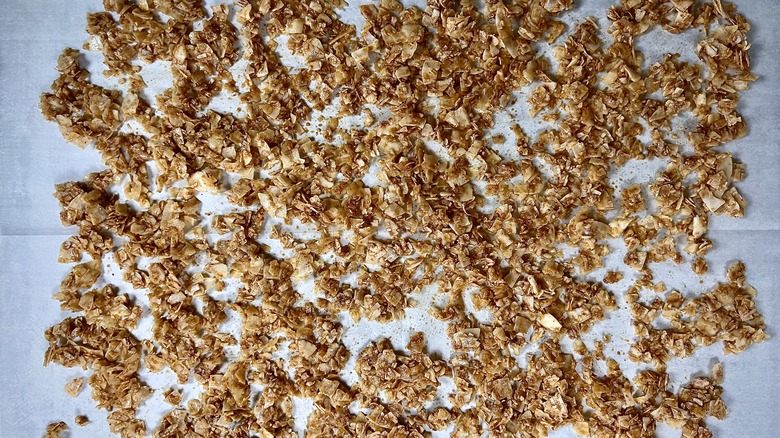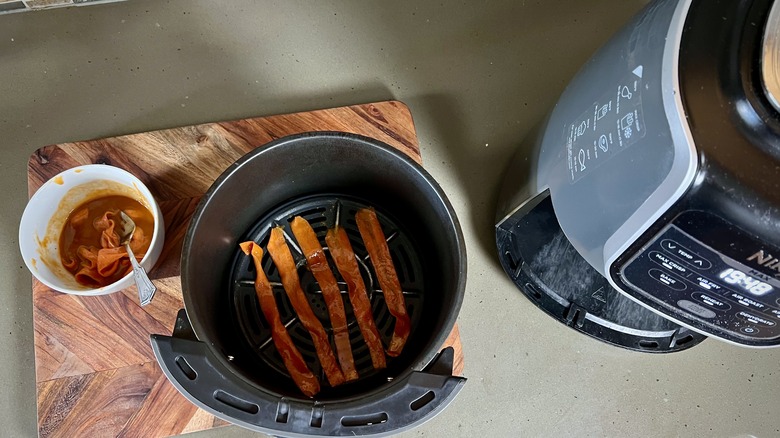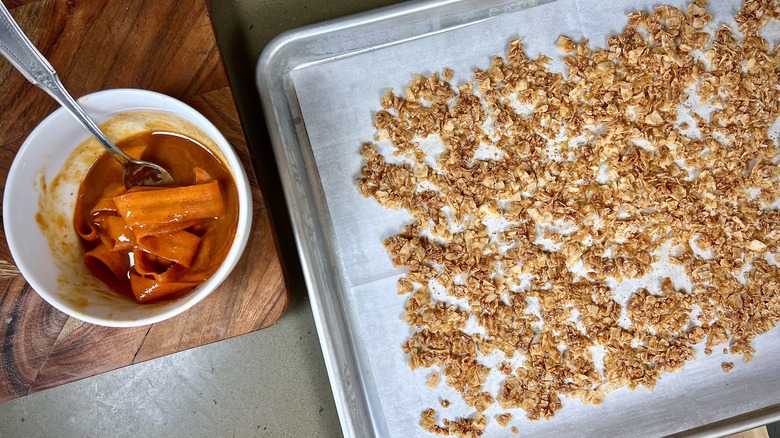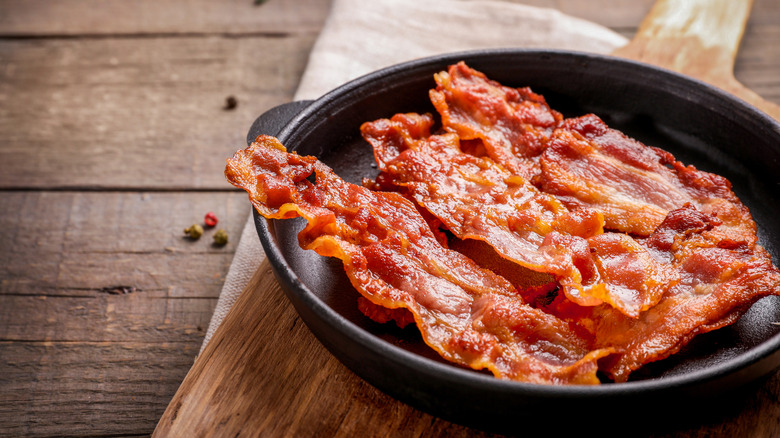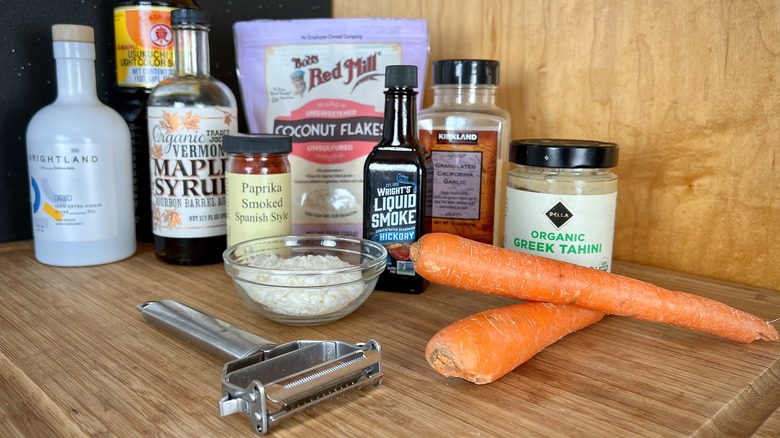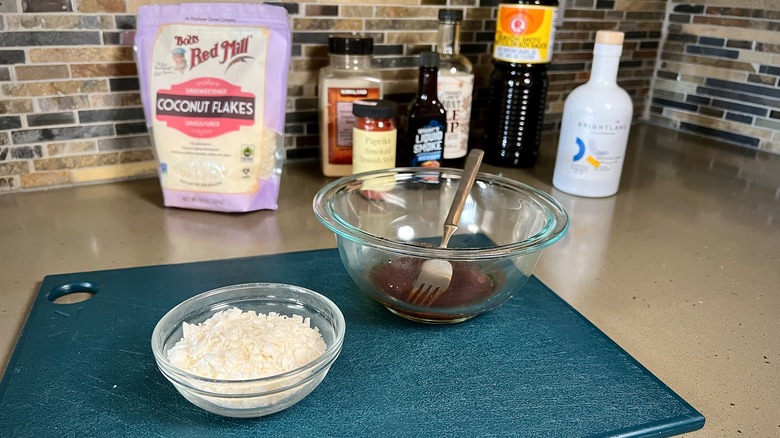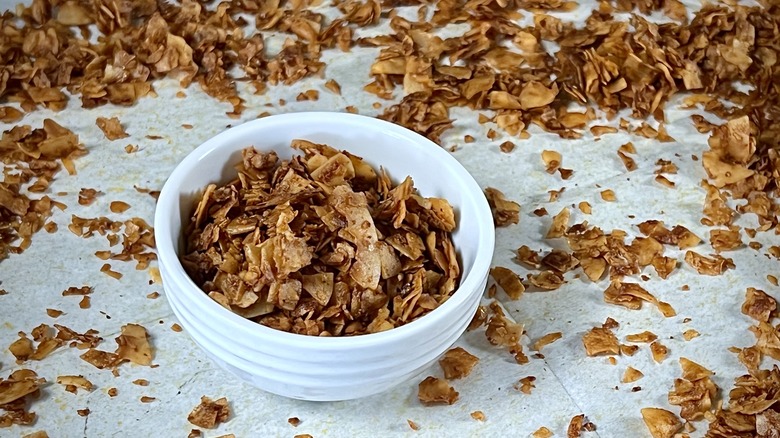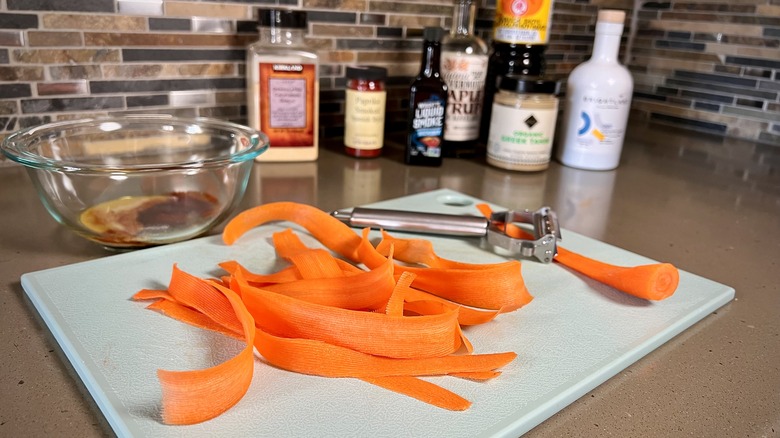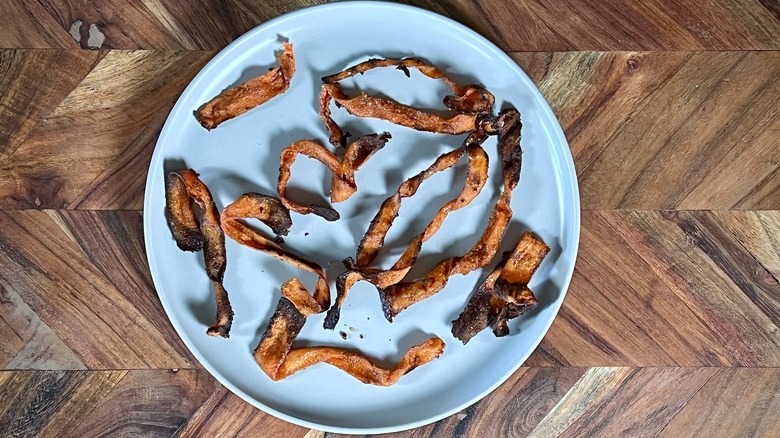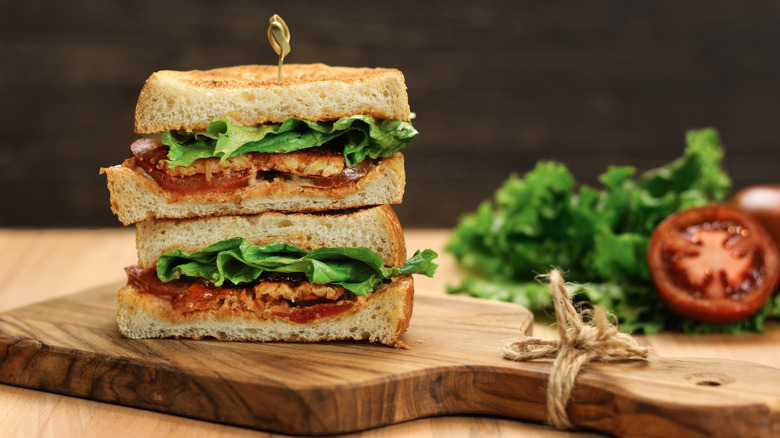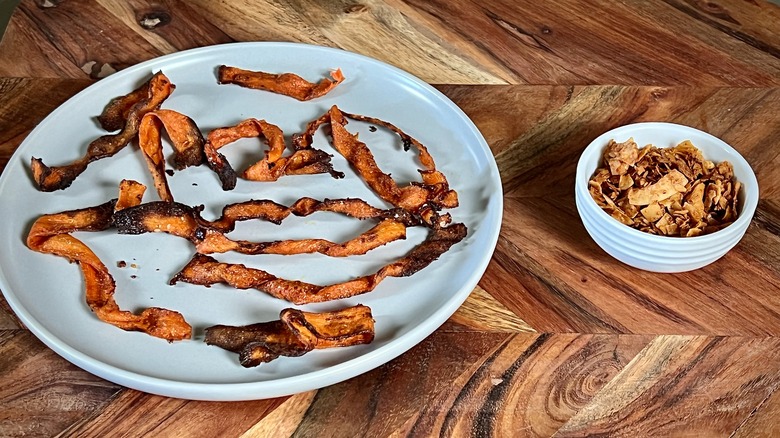Carrot Vs. Coconut Bacon: Which Is The Better Plant-Based Alternative To Make At Home?
There's no denying that bacon is delicious. Its intensely powerful aroma has a way of bypassing the brain's decision-making centers, convincing even the staunchest vegetarians that bacon will taste as good as it smells. That aroma doesn't lie, either; bacon's flavor really does have the perfect combination of fat, salt, sweetness, and smoke that makes us want to dig back in for slice after slice.
Luckily, if you're looking for a meat-free alternative, there are plenty of ways to take traditional bacon in a new direction. While the end result might not taste exactly like the classic salt-cured pork slab, it's close enough for most of us.
While there are many store-bought options made with plant-based proteins like tofu, tempeh, and seitan, you can also make your own mushroom bacon using a food dehydrator or fuse strips of rice paper together to make vegan bacon that's actually crispy. But if you want to keep things quick, easy, and inexpensive, bits of coconut bacon and carrot bacon strips are often considered your best bets. With that in mind, we created two recipes using a straightforward marinade made from a handful of pantry-staple ingredients to determine if either bacon alternative deserves a spot in your cooking repertoire.
The secret's out on coconut bacon
We discovered coconut bacon back in 2016, but it had been making its way around the online food blogging community for years. Today, you can find bags of this plant-based bacon in specialty stores or online retailers, but it's pretty painless to make at home. The idea is to combine unsweetened, flaked coconut with a smoky marinade and bake it to crispy perfection. Shredded coconut and flake coconut are both forms of processed coconut meat, but the wider flakes are thicker and will crisp up to crunchy perfection when baked in the oven.
The best part about this recipe is that it makes a large portion of bacon bits with very little hands-on effort. Simply mix the marinade, add the coconut, and bake it on a parchment-lined baking sheet. It results in a full cup of bacon bits, which can be stored at room temperature in an airtight container for up to two months or in the freezer for several months.
Carrot bacon is a TikTok sensation
Various carrot bacon recipes have been floating around the internet for a while, but the concept got its moment in the spotlight in 2022 with Tabitha Brown's viral carrot bacon recipe. The TikTok video got over 2 million views when the Food Network star showed how easy it is to transform carrots into strips of bacon using an air fryer. It only requires a handful of ingredients and five minutes of cooking time, so this recipe is for anyone who wants to make a bacon recipe in the same amount of time it takes to toast bread for their sandwich.
Of course, anything that sounds too good to be true might be, and we found that a few minutes in the marinade wasn't enough time. 30 minutes of marinating time created carrot strips that soaked up more bacon-forward flavor, so we suggest planning ahead just a little bit when making this version of vegan bacon.
How much does it cost to make carrot or coconut bacon?
Our recipes for carrot and coconut bacon use a lot of the same ingredients, and while the price per batch is fairly similar, one makes more vegan bacon than the other. At our local Fred Meyer grocery store, a 2-pound bag of carrots cost $2, and the large carrot we used weighed 4 ounces (about $0.25). We calculated the rest of the ingredients cost $0.98, so the total recipe came in at just under $1.25. This made 14 very thin strips of carrot bacon that weighed 1 ounce after cooking.
The 10-ounce bag of unsweetened coconut flakes cost $4.99, and we used 1 cup for the recipe. Add that $1.05 to the remaining ingredients cost of $0.68, and the total recipe came in at just under $1.75. This made a full single cup of coconut bacon that still weighed 2 ounces after cooking.
The carrot bacon might have cost slightly more considering the yield, but both are very reasonable compared to real bacon. A Kroger-brand bag of Real Bacon Bits cost $2.69, and it only contains 3/4 cup of bacon. The same brand of thin sliced Naturally Hardwood Smoked Sliced Bacon cost $4.79 for 14 slices.
Is carrot or coconut bacon healthier than regular bacon?
Compared to regular bacon, our homemade plant-based bacon doesn't have a significant difference in calories, and it may contain more grams of fat depending on the recipe. Both lag significantly behind in protein content, but neither homemade versions contain cholesterol. Carrot and coconut bacon have a significantly reduced sodium content, too.
Using the VeryWell Fit recipe calculator, one slice of the carrot bacon contains 21 calories, 1.6 grams of fat, 0 milligrams of cholesterol, 30 milligrams of sodium, 1.8 grams of carbohydrates, and 0.3 grams of protein. Compare that to a slice of Kroger brand Naturally Hardwood Smoked Sliced Bacon which contains 35 calories, 3½ grams of fat, 7½ milligrams of cholesterol, 160 milligrams of sodium, 0 grams of carbohydrates, and 2½ grams of protein.
A 1-tablespoon serving of coconut bacon contains 36 calories, 3.4 grams of fat, 0 milligrams of cholesterol, 39 milligrams of sodium, 1.8 grams of carbohydrates, and 0.3 grams of protein. The same serving of Kroger Real Bacon Bits contains 25 calories, 1.5 grams of fat, 5 milligrams of cholesterol, 220 milligrams of sodium, 0 carbohydrates, and 3 grams of protein.
Required ingredients and cooking equipment
The ingredients list here is relatively simple, and both contain the same marinade ingredients (except that the carrot bacon has one extra addition: tahini). You'll need a bottle of soy sauce, maple syrup, and liquid smoke to get started. We were only able to find hickory liquid smoke at our local grocery store, which is a common wood used to smoke bacon. (Feel free to use mesquite or applewood-flavored liquid smoke if you can find them.)
Many recipes we consulted use a neutral-flavored oil like avocado oil or canola oil because of their high smoke point (the temperature at which heated oil begins to smoke). We used pure olive oil because it's what we had on hand. Olive oil's smoke point is between 390 to 470 degrees Fahrenheit, making it a suitable ingredient for both temperatures used in these recipes. If you only have extra-virgin olive oil in your pantry, we recommend reaching for vegetable oil, which has a higher smoke point.
For the coconut bacon recipe make sure to use a cup of unsweetened coconut flakes. Avoid sweetened coconut or shredded coconut, as both of these varieties are unsuitable for this recipe. As for the carrot, the bigger the better to ensure long strips.
The process for making coconut bacon
The coconut bacon was extremely easy to make. We whisked together a marinade consisting of 1 tablespoon olive oil, 1 tablespoon soy sauce, 2 teaspoons pure maple syrup, 1 teaspoon liquid smoke, 1/2 teaspoon smoked paprika, 1/2 teaspoon garlic powder, and a pinch of kosher salt. The salt is optional if you're looking to cut down on sodium, and you can substitute gluten-free tamari or coconut aminos for the soy sauce if desired.
From there, we added 1 cup of unsweetened coconut flakes. It's important that you don't use shredded coconut here, as these tiny pieces won't resemble bacon bits and can burn easily in the oven. The flakes soaked up the marinade very quickly, so you'll want to stir well to make sure each piece is coated. From there, transfer the seasoned flakes to a parchment-lined baking sheet, breaking up the clumps and creating a single layer. We found a fork was more helpful here than a spatula.
Bake the marinated coconut in a 325 degrees Fahrenheit oven for 5 to 7 minutes before stirring the coconut flakes to ensure even cooking. Cook for an additional 7 to 10 minutes until the coconut is darkened. It will not be crispy at this point, but it will crisp up as it cools for about 10 minutes.
The coconut bacon was crispy, but dry
Before we cooked the coconut bacon, we tasted the raw components to prepare ourselves for what the finished product might taste like. The marinade had a heavy spice presence, and the fattiness of the oil was fairly pronounced. Any smoke presence from the liquid smoke seemed like an afterthought, with the paprika and garlic coming through in a pronounced way, and the marinade was more savory than sweet. The raw coconut flakes were chewy and dry, and they only tasted mildly of coconut.
After we cooked the coconut bacon, those individual components came together to create a cohesive set of flavors. The bits definitely crisped up as they cooled, creating a crunchy texture that perfectly mimicked real bacon bits. The liquid smoke came through in a big regarding aroma, and the batch smelled like freshly cooked bacon. The coconut pieces had a nice level of savoriness and salinity, but they finished very dry, and a lingering coconut-forward flavor remained on our palates after we finished chewing.
What went into making carrot bacon
Making the carrot bacon requires a cutting board and a vegetable peeler to peel the carrots into "bacon" slices. You'll need to press down deeply into the carrot as you're peeling to make even slices, and you'll end up sacrificing some of the carrot on the top in the process. Our original carrot weighed 4 ounces, but we only came away with 2 ounces of cooked slices.
The process started with mixing our marinade: 1 tablespoon olive oil, 1 tablespoon maple syrup, 2 teaspoons soy sauce, 1 teaspoon liquid smoke, 1/4 teaspoon garlic powder, and 1/4 teaspoon smoked paprika. Brown didn't add tahini to her recipe, but after consulting a few online resources, we decided to add 1 tablespoon tahini to the mix to provide an earthy flavor that would balance out the carrot's natural sweetness. We tried leaving the carrot in the marinade for 5 minutes, but it didn't taste like much. We kept increasing the time and found that 30 minutes was the sweet spot. Using the air fryer, the slices are finished in 5 minutes at 375 degrees Fahrenheit. Our air fryer only fit about five slices without causing overlap, so we had to make this recipe in multiple batches.
Though flavorful, the carrot had its issues
The raw carrots peels tasted exactly like what we'd expect, but using the vegetable peeler took away most of the carrot's characteristic snappy, crispy bite. The marinade was very sweet and deeply smoky, and the garlic powder and paprika worked together to bring a nice savoriness to the mix. We liked that you could pick up the hickory flavor, but the tahini ended up being a little controversial — some tasters thought it added a bitter note to the carrots. It did bind the oil and liquid ingredients into a cohesive mixture, though, so the carrots were well coated.
The first batch came out a little sweet, but sprinkling kosher salt on the slices just before cooking them fixed this issue. The salt brought out the savory flavors we normally associate with bacon. We were a little frustrated when the air fryer blew the lightweight carrot slices around inside the unit, so we would consider cooking this in the oven the next time around. Instead of creating perfectly straight bacon slices, ours were curled and burnt on the edges. That said, we actually liked how the burnt look added to the bacon-like aesthetic, and we appreciated that the slices turned out perfectly crispy after only 5 minutes (it would have taken much longer to cook in the oven). The end result was a perfect mixture of sweet, salty, savory, and smoke that we expect from bacon.
There are plenty of ways to use both
At the end of the day, either recipe is a suitable replacement for regular bacon if you're trying to incorporate more plant-based foods into your life. We liked that the coconut bacon recipe required little to no cleanup (especially if you used a sheet of parchment paper to keep the baking sheet from getting dirty). These bacon bits would be perfect on baked potatoes, as a garnish for soups, or used to take deviled eggs to the next level.
The carrot bacon won't last as long as coconut bacon (it's only good for about three days after cooking, but it we wouldn't anticipate that being a problem. Our carrot recipe only made 14 thin strips per carrot, so it was easy for our eaters to devour the entire carrot within minutes. These strips taste great as a snack on their own, but they would also be fantastic when served in a sandwich. Try using it to make a vegan BLT that's actually crispy, or crumble the carrot strips and use it on pizzas or add it to pastas or salads.
The verdict: Carrot bacon for the win
The taste testers all preferred the initial crispiness of the bacon bits over the carrot's crunch because it felt like a more authentic bacon-eating experience. However, most of the tasters agreed that the carrot is the bacon replacement they would want to eat again. The coconut finished too dry and retained enough of a coconut-forward flavor that distracted from the other flavors. While it isn't as noticeable when combined with other ingredients, it was certainly present when enjoyed alone.
On the other hand, the carrot bacon didn't resemble a carrot's flavor at all. The oil came through nicely to provide an unctuousness that mimicked bacon's fat content, and the smoky-sweet combination tasted more like the real deal strips. It was also juicier than the coconut bacon and had a better after-taste. Some of the tasters disliked the lightly bitter edge, though, which perhaps came from the burnt edges or was caused by the addition of tahini. Even with that in mind, considering that the carrot version can also be used for bits and crumbles applications, there was no doubt that it was the undisputed bacon alternative favorite.
